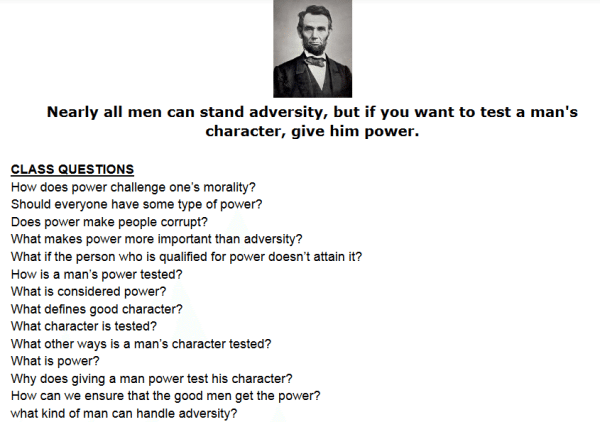Where was the Question Formulation Technique (QFT) 23 years ago? When I began teaching social studies in 1993, I relied on teacher-generated questions to frame my government curriculum. After first reading about the QFT in the September/ October 2011 edition of the Harvard Education Letter, I changed the way I teach. I have come to realize that habitual reliance on teacher-generated questions often frustrates student interest. When students are the designers of their own questions, they are more engaged in lessons. I am now sharing this amazing resource with my colleagues in the field with the hope that they too see the intrinsic value of giving students more power over their own learning.
As a high school teacher, I have used the QFT in a variety of ways over the past three years in my philosophy, government, and advanced placement government courses. One example of how I have used the QFT is to frame a unit on the American presidency in my 12th grade advanced placement government course. The content of the unit is designed to teach students about historical events when Presidents of the United States faced adversity, including wartime decisions, impeachment, and battles with Congress.
past three years in my philosophy, government, and advanced placement government courses. One example of how I have used the QFT is to frame a unit on the American presidency in my 12th grade advanced placement government course. The content of the unit is designed to teach students about historical events when Presidents of the United States faced adversity, including wartime decisions, impeachment, and battles with Congress.
After walking the students through the easy steps of the QFT, I share one of Lincoln’s famous quotes on power: “Nearly all men can handle adversity; but if you really want to test a man’s character, give him power.” This quote, which I use as a Question Focus (QFocus), has been successful in eliciting students’ thought provoking questions:
What can power tell us about a man’s character?
How can power be obtained by adversity?
Why are some people affected by power differently?
If adversity supposedly makes you stronger, does that mean that power makes you weaker?

As a part of prioritization, each group of three students selects their consensus favorite question and adds it to the class’s list. Each individual student then selects a question from the class list which they will work to answer as we move through the unit. Students harness and express their knowledge in a two-page reflection which answers the question they selected. Students then share their reflections in a culminating class discussion on the final day of the unit. This discussion is rich with original thinking and student engagement, no doubt due to the fact that because students had been answering questions they had developed themselves, they were personally invested in the learning process. It is one of my favorite discussions of the year. What a gift QFT is!
This strategy has been so transformative for my teaching that I have incorporated it as a part of an online course for middle and high school social studies teachers which provides educators an opportunity to construct original lessons and units using the QFT. Aligned with the C3 Framework social studies standards, this course is especially useful for teachers who are looking for a convenient, practical way to put student-generated questioning at the heart of student learning. The QFT is just one of several resources covered during the online course. Other approaches to eliciting student questions and teacher-generated questioning strategies will be included. If you are interested, please signup or contact me via e-mail at danfouts@republicfoundation.org
Daniel Fouts is a government and philosophy teacher at Maine West High School in Des Plaines, I L. He serves as a member of the committee on pre-college instruction in philosophy through the American Philosophical Association, and is a Board Advisor for The Republic Foundation, a Chicago-based nonprofit which provides professional development for educators and leadership programs for youth. Follow Daniel Fouts on Twitter @dmfouts.
L. He serves as a member of the committee on pre-college instruction in philosophy through the American Philosophical Association, and is a Board Advisor for The Republic Foundation, a Chicago-based nonprofit which provides professional development for educators and leadership programs for youth. Follow Daniel Fouts on Twitter @dmfouts.
This blog was made possible through the support of a grant from the Sir John Templeton Foundation. The opinions expressed in this publication are those of the author(s) and do not necessarily reflect the views of the John Templeton Foundation.




Speak Your Mind